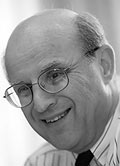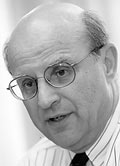|
|
Nicholas Wolsonovich: “That’s the only reason we have to exist, to teach as Jesus did.
If we’re not that, then we shouldn’t call ourselves Catholic.”
Catholic New World photos/David V. Kamba
Making sure schools are ‘Catholic,’ accessible
This week, Catholic New World staff writer Michelle Martin talks
with Nicholas Wolsonovich.
|
|
|
|
The Interview, a regular feature of The Catholic New World, is an in-depth conversation
with a person whose words, actions or ideas affect today’s Catholic.
It may be affirming of faith or confrontational. But it will always
be stimulating.
|
|
Roughly 130,000 students are heading back to Catholic schools
for the new academic year, and they are joined by new Superintendent
Nicholas Wolsonovich. Wolsonovich, 57, took the helm of the archdiocesan
schools office this summer, and he is working on getting to know
the archdiocese and its 304 elementary schools and high schools,
while bringing the benefit of his 28 years of Catholic school
administration in Youngstown, Ohio.
The Catholic New World: What are your goals for this year?
Nicholas Wolsonovich: The goals I have coming in are to learn the situation, to learn
the schools, to learn the context that our schools are operating
in. There’s a lot of people to learn about, there’s a lot of situations
to learn about. In this job you’re always learning, but the learning
curve has to be significant right here at the very beginning.
I’m meeting with people to find out about what they do, how they
do it and what needs to be done. Eventually, you can put that
in an overall plan.
However, at the same time I say that, I would say that I’ve been
doing this since Dec. 15 when I had my first interview. At that
time, I began to study the archdiocese in terms of what I think
the issues are, and to see whether or not I wanted to take the
job. The same themes keep coming back. The theme is planning so
that we can keep as many of our schools viable so that they can
serve as many kids as possible. We want to make sure that there
are Catholic schools available to any child in the archdiocese
who wants to attend a Catholic school, high school and elementary.
That’s going to be a major part of what I do.
The other major thrust is the whole issue of working with everybody
and anybody to procure the kind of financial resources to allow
the planning to happen, to make that viable.
TCNW: As of next week, I will be a Catholic school parent for the first
time. As a parent, what should I expect from her Catholic school?
Wolsonovich: That’s a question parents ask all the time, and my response
to that is just exactly what you said, that it should be a Catholic
school. I don’t think we should take that lightly. I don’t think
if we have a cross in the school and we say it’s Catholic that
it’s Catholic. I think we have to work at it being Catholic.
I use the phrase “thoroughly Catholic.” By that, I mean that the
staff, the principal and the teachers, are committed to being
ministers of the Word to young people in everything that happens
in a Catholic school. That means not just teaching religion in
religion class, but teaching religion in science and in history
and language arts. It means making sure that your administrative
procedures and your classroom procedures reflect justice. It talks
about how you work with parents, it talks about the art that’s
in the school, it talks about how professionals talk to each other
about kids. It’s about the worship that goes on in the school,
which would be liturgy and paraliturgy, and also prayer in the
classroom.
That’s the only reason we have to exist, to teach as Jesus did.
If we’re not that, then we shouldn’t call ourselves Catholic.
At the same time, I want to say I think we do a good job with
that. We’re good, but we can be better.
Along with that philosophy goes the whole idea of what does that
mean for history, social studies, language arts? It means academic
excellence in all those different arenas. I think that explains
why we strive for academic excellence in everything, in all our
extracurricular activities. I would expect a parent to say, if
it’s Catholic, then it’s striving for excellence.
TCNW: Given the St. Sabina situation, what place does athletics
have in Catholic education?
Wolsonovich: That’s the beautiful part about a Catholic school education.
It addresses the whole child: not only the mind, with academics,
but also the spiritual side, and along with that goes the physical
side. Athletics is part of that whole formula. But it’s also very
important that we conduct our athletic programs in a very Catholic
manner. That has implications, in terms of who do you schedule,
and how do you run practices, and do you play all the kids, and
is winning the only thing, and all those things that come into
question. You really need coaches who are committed to kids in
a Catholic manner to be in charge of those programs, so that’s
a real challenge.
TCNW: This archdiocese includes areas where parents are lining
up to send their kids to Catholic schools, even at full-freight
tuition, and areas where parents can barely afford even subsidized
tuition. How do you try to even things out?
Wolsonovich: How you even it out is making sure that there is money available
for scholarship programs so that all kids are able to afford and
attend a Catholic school who want it. We do not want to become
schools for the elite and the wealthy. In terms of “catholic,”
catholic means all, universal, so we want to serve all the children.
That’s a real challenge, because as tuitions increase, we really
have to come up with an awful lot of money for scholarship programs.
To a great extent, Big Shoulders does that. But there’s even more
need than what Big Shoulders can provide, so we’re always looking
for additional revenue sources. …
Are we doing our best? I think that’s a question the parishes
have to keep asking themselves, especially when you look at the
giving patterns of Catholics versus the giving patterns of other
religious groups. I think we should just hold up what’s happening
in the Wichita Diocese, where there is no tuition at all. It’s
all stewardship. And people give a lot more money in that area
than they do in most places across the country. But they are able
because of that to not charge for any parish ministries—not the
Catholic school, the parish school—and if the kid wants to go
to Catholic high school, they’ll pay for that, too. That only
works when the people in the parish say this needs to be supported
by the whole parish, not just those who are users. There’s two
ways to go: users pay, or everybody pays. Where we need to be
is somewhere in the middle.
TCNW: In June, the Catholic schools office released a study showing
that the longer kids were in archdiocesan Catholic schools, the
better they did on standardized tests. What does that tell you?
Wolsonovich: What Father (Andrew) Greeley (of the National Opinion Research
Center at the University of Chicago) had been saying for years
was that the longer kids stay in (Catholic) school, the more active
Catholics they become. There is substantial correlation between
attending Catholic schools for 10 years or more and being a hopeful
person. The longer a kid stays in a Catholic school, he becomes
a more faith-filled, active adult Catholic. From the point of
view of faith, that’s true. Now we look at academics, and we see
it’s also true there. When you look at whether or not the investment
we make, as parents and church, is achieving its goals, we can
say absolutely, resoundingly yes, from the point of view of religious
education and from the point of view of academics. This is research
we don’t use often enough when we talk to parents. These Catholics
also give more money, because they see the tremendous commitment
of the church.
Sometimes people don’t want us to say these things, because they
don’t want to upset those who didn’t go to Catholic schools, but
that’s part of the research and that’s part of the reality. We
can say to parents, there’s a lot of good reasons your kids should
go to Catholic schools, and there’s hard evidence.
TCNW: Then why is it so difficult to persuade Catholic elementary
school students to attend Catholic high schools?
Wolsonovich: One of the things that’s very disconcerting to me is when I
would go around and talk to eighth-grade students, and I would
ask them where they were going to go to school next year, they
would tell me X, Y or Z. But the troublesome thing was when I
would ask them who made that decision, and they said they did.
I really think parents should not allow their eighth-graders to
make that decision. The value, the benefit of going to a Catholic
high school—and elementary school—the benefits are so fantastic
that I don’t think a parent should say to a kid, you go wherever
you want to. I think parents are reneging on their parental responsibility.
My God, will that get a headline! Parents who send their kids
to Catholic schools are absolutely dying to hear someone say those
things, because they are making the commitment for reasons that
we’re talking about here.
I am not afraid at all to state very strongly that there are reasons
parents should send their kids to Catholic school, and they’re
documented with research, they’re documented with hard facts.
And I also feel very strongly that parents should make that decision,
not the kids. I bet 50 to 60 percent of the parents allow their
kids to make that decision—that’s my experience, maybe it’s different
here. It’s almost like parents say, I’ve got so much money, I’m
going to spend it either on high school or elementary school.
Front Page | Digest | Cardinal | Interview
Classifieds | About Us | Write Us | Subscribe | Advertise
Archive | Catholic Sites | New World Publications | Católico | Directory | Site Map
|









